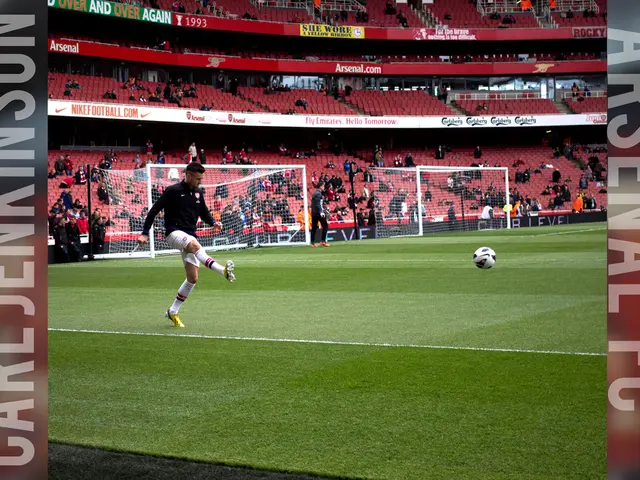UFC's Business Model Under Threat: Long-Term Contracts in Question
Unforeseen legal action poses potential disruption to UFC's commercial structure
By Mike D.
Facebook Twitter Whatsapp E-Mail Print Copy Link
The UFC, the powerhouse of mixed martial arts, relies on long-term contracts with its fighters that prevents them from jumping ship easily to other promotions. But, recent lawsuits could shake up this arrangement.
UFC's payment structure has been under fire due to its dominant position, leaving many fighters feeling underpaid. This has led to a class-action lawsuit that was partially settled for $375 million after a decade. Now, two fresh lawsuits are poised to disrupt the UFC's current business model, bringing about major changes for the entire MMA community.
MMA fighters, unlike athletes in traditional sports, are not employees of a team. Instead, they operate as independent contractors who are bound to specific contract terms and fight commitments by the promoter. A typical MMA career clocks one fight every six months due to the high risk of injury. Complex contract terms, often leaning in the promoter's favor, make things more complicated.
After years of legal wrangling, several former UFC fighters sued Zuffa LLC, the parent company of the UFC. The UFC wanted to settle the case out-of-court, but the judge ruled against it. The judge criticized the compensation as insufficient, the contract clauses restricting more fighters from participating in the lawsuit, and the UFC's lack of a plan to address its alleged monopolistic position.
One of the new lawsuits challenges the contract system of the UFC, alleging that it creates a barrier for other professional MMA promotions, like the Professional Fighters League (PFL), to secure top-tier MMA fighters. This lawsuit seeks to prove that the contractual practices of the UFC hinder smaller promoters from hosting high-quality fights and competing with the UFC.
The second lawsuit, filed in late May, is unusual and intriguing. Phil Davis, a former UFC fighter, is not seeking damages but aims to force the UFC to reconsider its contractual practices. Davis is pushing for a "sunset clause," a contract provision that guarantees certain commitments automatically expire or become null after a set time frame, offering fighters the ability to terminate their contracts early. Although the UFC briefly included such a provision in its contracts after the first lawsuit was filed in 2014, it was later removed.
Davis' proposed sunset clause could significantly impact the MMA world. With shorter contract terms, many UFC fighters might switch organizations frequently, leading to constant salary renegotiations, ensuring market-based pay while leaving large organizations with minimal planning security. If the UFC adopts such a clause, other MMA promotions might follow suit, resulting in high turnover rates, fewer iconic figures, and potential financial losses for the UFC as top stars gravitate towards more lucrative offers elsewhere.
The outcomes of these lawsuits are uncertain. However, given the judge's previous concerns about the UFC's potential monopoly status, long legal battles seem probable. If the UFC is forced to alter its contractual practices, the MMA landscape could undergo significant changes, impacting fighters, promoters, sponsors, and fans alike.
Sources: ntv.de, mmafighting.com, bleacherreport.com
- Mixed Martial Arts
- Ultimate Fighting Championship
Prospects:
If the UFC's contractual practices are deemed restrictive and exploitative, several potential implications could surface for the UFC and the mixed martial arts industry:
- Increased Unionization Efforts:
- Unified Action: If fighters perceive their contracts as unfair, they may organize to negotiate better terms, potentially leading to collective bargaining power and improved compensation and working conditions.
- heightened Regulatory Scrutiny: Unionization activities might attract regulatory attention, resulting in stricter oversight of contract practices in the industry.
- Implementation of Sunset Clauses:
- Contractual Agility: Sunset clauses would offer contract flexibility, permitting fighters to renegotiate contracts or explore opportunities more freely. This could foster a more competitive market for fighter talent.
- Financial Ramifications: Faced with increased contract costs, the UFC might struggle to retain top talent as fighters opt for more favorable deals elsewhere when their contracts expire.
- Public Image and Perception:
- Negative Publicity: Being branded as exploitative can harm the UFC's reputation, possibly deterring new talent and reducing fan support.
- Sponsorship and Revenue Impact: Negative publicity could also lead to lost sponsorship deals and revenue as companies may prefer to align with more ethical and fair organizations.
- Competitive Landscape:
- Emerging Competitors: The UFC may experience greater competition from other promotions offering more attractive contracts, thus siphoning away top fighters.
- Talent Drain: If fighters possess the opportunity to secure better deals elsewhere, a talent exodus may occur, weakening the UFC's roster and impacting the quality of its events.
- Legal Challenges:
- Contract Disputes: Fighters might contest the legality of their contracts, resulting in costly legal battles for the UFC.
- Regulatory Intervention: Government or regulatory bodies might step in to set industry standards, further complicating the UFC's operations and escalating costs.
In summary, these potential ramifications of UFC's restrictive contracts could bring significant transformation to the MMA industry, including increased unionization, contract reform, and potential legal and financial obstacles for the UFC.
Mixed martial arts fighters are questioning the UFC's current contractual practices, specifically the long-term contracts that bind them to the promotion, in the context of the sports industry. The recent lawsuits against the UFC, such as the one filed by Phil Davis for implementing a sunset clause, could potentially lead to a more competitive MMA landscape, providing fighters with increased contract flexibility and fostering a more equitable distribution of resources within the industry.







